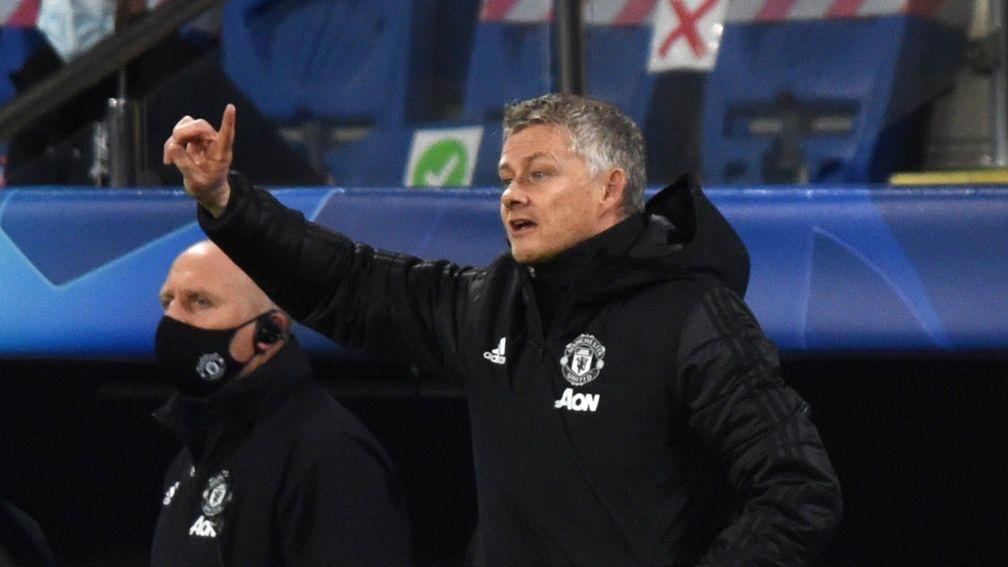Manchester United's form continues to fluctuate under Ole Gunnar Solskjaer
Simon Giles analyses the inconsistent Red Devils

The narrative surrounding Ole Gunnar Solskjaer has routinely fluctuated from him being the man to steer Manchester United back to the top of the English pyramid to him being a novice out of his depth ever since he took the Old Trafford job in December 2018.
The graph below captures the swing in mood, charting the rolling average of points won for all clubs since the start of the 2018-19 season.

It shows how United have been streaky under Solskjaer, starting with them taking 32 out of a possible 36 points in the 12 games immediately after he replaced Jose Mourinho.
Things tailed off shortly after he was appointed permanently and the pattern since the arrival of Bruno Fernandes midway through the 2019-20 season is of a team capable of going on bursts of title contending form but interspersing those spells with big drops.
From an underlying metrics perspective, however, things have been more constant. The second graph below charts the rolling average for expected goal difference (xGD) for all teams over the same period.

Again, the immediate upturn just after the Norwegian's arrival and the decline at the start of last season stand out, but over the long term, Solskjaer's United have consistently posted numbers in line with being the fourth best side in the division.
Despite last season’s second-placed finish, United were only fourth in expected points, with Chelsea (only had Tuchel for half a season), and Liverpool (injury-hit) still moving ahead of them on that metric.
During the run of form from November to late January that saw them talked as title contenders their metrics improved from their woeful start, but still only enough to have between the third and fourth best xGD during that run.
They won ten of 13 games, but seven of those wins were by a single-goal margin and a lot of them were characterised by individual moments of brilliance rather than sustained team pressure.
When you have as many match winners as United do, that is fine when they run hot, but without the underlying structure to fall back on, it doesn’t take much of a negative variance swing (think the likes of Bruno Fernandes, Mason Greenwood and Paul Pogba scoring from outside the box with slightly less frequency) for points to be frittered away quickly.
This season is only two months old but has already captured the full narrative see-saw, with the Old Trafford outfit going from title challengers after winning four of their first five and signing Cristiano Ronaldo, to the wheels having apparently fallen off.
Worryingly this term, the underlying numbers have declined with United currently eighth in xGD according to FBref despite them playing a favourable schedule. Wins against Wolves and West Ham in particular were reliant on big saves from David de Gea.
Things may get worse in the short term as the fixture list bites back, but the Solskjaer cycle and sheer volume of talent in the squad suggests that the upturn will follow eventually. It’s just that for some people, expectations were higher given the money spent in the summer.
Spreadex pencilled United in for fourth at the start of the season (13 points behind the projected champions and 13 points clear of the projected fifth). Their spreads still anticipate a fourth-placed finish now (16 points behind top spot and 11 ahead of fifth).
The old adage that things are never quite as rosy as they seem on their good runs, nor as desperate as they appear on their bad runs, holds true for Solskjaer’s United.
The squad is stacked with talent, it just isn’t evenly distributed among different positions. There are only so many forwards you can have on the pitch at once, and players like Ronaldo and Fernandes rely on receiving the ball in high volume to make things happen, which is a problem for a side who are laboured at progressing the ball between the lines from back to front.
A central midfielder and right back who are comfortable on the ball would help. But it may take an upgrade in the coaching to fully develop the movement when in possession needed if they are ever to break out of their current cycle under Solskjaer and become a team resembling more than just the sum of its individual parts.
Solskjaer isn’t as bad as some of his fiercest critics would suggest and he has helped navigate the club to it’s healthiest outlook post-Sir Alex Ferguson.
It’s just that he hasn’t yet demonstrated that he can take them all the way to where they want to get to, and compete with sides coached by Guardiola, Tuchel and Klopp over a full season, either.
Not got a bet365 account? Sign up today and get up to £100 in bet credits
Up to £100 in Bet Credits for new customers at bet365. Min deposit £5. Bet Credits available for use upon settlement of bets to value of qualifying deposit. Min odds, bet and payment method exclusions apply. Returns exclude Bet Credits stake. Time limits and T&Cs apply.
Today's top sports betting stories
Follow us on Twitter @racingpostsport
Published on inThe Assist
Last updated
- Didi Hamann: Reinforced Newcastle can steer clear of Premier League relegation
- The signs are good for Champions League group winners
- The signs are good for Champions League group winners
- Aaron Ashley: Football predictions & free betting accumulator tips
- Aaron Ashley: Football predictions & free betting accumulator tips
- Didi Hamann: Reinforced Newcastle can steer clear of Premier League relegation
- The signs are good for Champions League group winners
- The signs are good for Champions League group winners
- Aaron Ashley: Football predictions & free betting accumulator tips
- Aaron Ashley: Football predictions & free betting accumulator tips